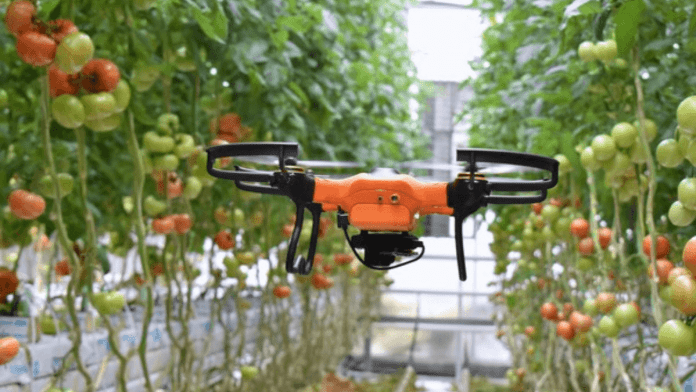News in Brief:
– Australian tomato farm adopts drones for pollination, overcoming challenges of manual methods and enhancing crop yields in controlled environments.
– While offering benefits such as labour efficiency and consistency, experts stress the importance of balancing technological innovations with preserving natural systems like bee populations.
Innovative solutions are taking flight at a tomato farm in South Australia, where drones are now buzzing around to assist with pollination, marking a significant shift in agricultural practices.
Perfection Fresh, a leading tomato producer in Australia, is pioneering this initiative to address the challenges posed by manual pollination methods, which have proven to be labour-intensive and inconsistent.
In controlled environments such as glasshouses, where temperature and other conditions are meticulously regulated, traditional pollination methods often fall short. With bees being less effective in covered environments, farmers face difficulties in ensuring adequate pollination, leading to concerns about crop yields and productivity.
A new approach to drone technology
Recognising the limitations of conventional methods, Perfection Fresh has turned to drones as a viable alternative. These drones, equipped with propellers that generate turbulence, efficiently disperse pollen, maximising pollination rates and ultimately resulting in higher crop yields. Moreover, drones offer advantages such as labor efficiency and consistency, addressing key concerns for farmers.

This technological innovation holds significant implications for local farmers, particularly in regions facing challenges such as extreme weather, pests, and land shortages. By embracing drone technology for pollination, farmers can mitigate risks associated with traditional methods and enhance their agricultural practices for improved outcomes.
Balancing nature and technology
The adoption of drones for pollination reflects broader trends in precision agriculture, driven by demographic changes, technological advancements, and climate change impacts. While initially tested in countries like Australia and Singapore, the potential of drone technology extends to other regions grappling with similar agricultural challenges.
While drones offer promising solutions, experts caution against viewing technology as a complete replacement for natural systems. The decline in bee populations underscores the importance of preserving biodiversity and recognising the multifaceted benefits that bees provide beyond pollination.
As drone technology continues to evolve, its integration into agricultural practices holds promise for enhancing productivity and sustainability. However, ensuring accessibility to such technology remains a challenge, particularly for smaller farmers and communities in developing countries.



